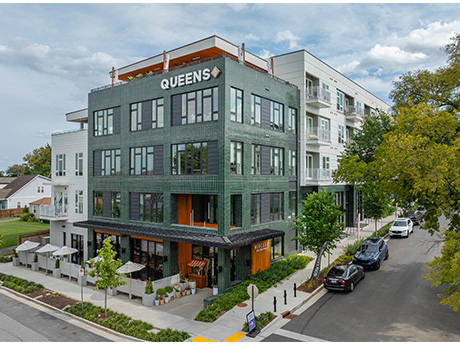Nashville’s multifamily sector has faced headwinds stemming from a wave of new deliveries over the past few years, similar to other high-growth areas across the country. Across this market, stabilized occupancy is currently 350 basis points below historical norms. Average market rents have declined nearly 3 percent from their 2022 peak, and concessions are widespread across several submarkets.

However, despite these challenges, optimism is building around the Nashville’s outlook over the coming years. Investors are actively seeking well-positioned assets, anticipating what many believe will be the next strong cycle for multifamily assets in this market.
Over the past three years, Nashville’s multifamily market has absorbed approximately 28,000 units, compared to roughly 30,000 new deliveries — creating a near-term supply-demand imbalance that contributed to recent softness.
Nevertheless, the outlook is shifting. Only 17,000 units are expected to deliver between 2025 and 2027, while demand is expected to exceed this new supply materially, creating strong tailwinds for rent growth. In 2024 alone there were over 11,000 units of net absorption.
New starts are few and far between, mostly concentrated in suburban submarkets where developers can build cost-effective, attainable housing. Elevated construction costs and higher interest rates continue to constrain development, pointing to a structurally undersupplied market for the foreseeable future.
Transaction volume in Nashville’s multifamily market has fallen sharply from the 2022 peak, when nearly $6 billion in assets traded hands. In contrast, 2024 saw just $1.4 billion in sales — a result of rising interest rates, valuation resets and broader market uncertainty. Through first-quarter 2025, approximately $540 million in volume has been recorded, with expectations that deal activity will accelerate as the year progresses.
Cap rates have increased roughly 100 to 200 basis points since the peak, depending on the asset and location quality. Although this is not as steep as many other markets, it is still enough to deteriorate values and give would-be sellers reason to pause. As a result, many owners are opting instead to take advantage of healthy credit markets, refinancing into short-term bridge loans or finding ways to work out extensions with existing lenders.
Despite the overall slowdown in deal volume, several notable transactions that we closed recently signal that market activity is beginning to show signs of renewed momentum. In February 2025, Origin Investments acquired Queens Wedgewood for $79.4 million. Queens is a recently stabilized, 221-unit mid-rise asset developed by Proffitt Dixon in the city’s sought-after Wedgewood-Houston (WeHo) submarket. The property features 7,100 square feet of commercial space, highly curated amenities and units averaging 790 square feet in size. At the time of sale, the property was approximately 93 percent occupied, with average rents around $2,200 per month.
Earlier in 2024, Oregon-based Bonaventure acquired Alta Farms at Cane Ridge for $86 million. The 336-unit, three-story, walk-up community was recently delivered by Wood Partners. Located on the edge of the expansive Century Farms mixed-use development, Alta Farms achieved stabilization in early 2024 following a successful lease-up campaign, with average rents of approximately $1,825 per month.
While Nashville’s multifamily market has navigated a challenging stretch marked by elevated supply, softening rents and muted transaction activity, signs of stabilization and recovery are beginning to emerge. The slowdown in new construction, paired with sustained demand and population growth, is helping to rebalance fundamentals and set the stage for renewed rent growth in the coming years.
Even as cap rate expansion and market uncertainty have kept several participants on the sidelines, lenders remain accommodative, and well-capitalized investors are actively pursuing opportunities. Recent trades suggest that confidence is returning, particularly for high-quality, well-located assets.
While caution is still warranted given the evolving macroeconomic backdrop, the worst of the supply pressure may now be behind the market. As new deliveries taper and demand continues to outpace supply, Nashville appears poised to enter its next chapter of growth — offering a window of opportunity for long-term investors willing to lean in during a period of transition.
— By Russ Oldham, Managing Director of Walker & Dunlop Investment Sales LLC. This article was originally published in the April 2025 issue of Southeast Real Estate Business.


